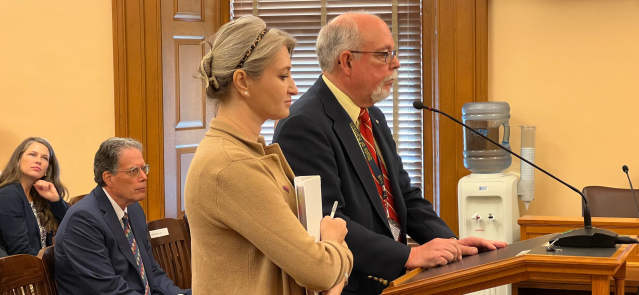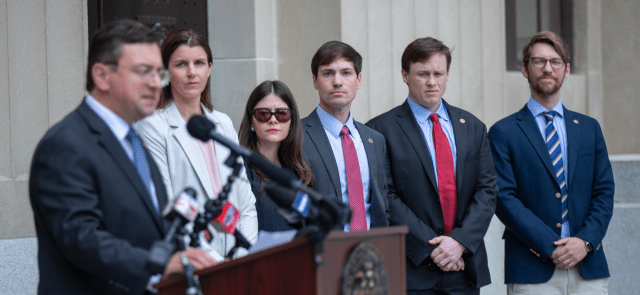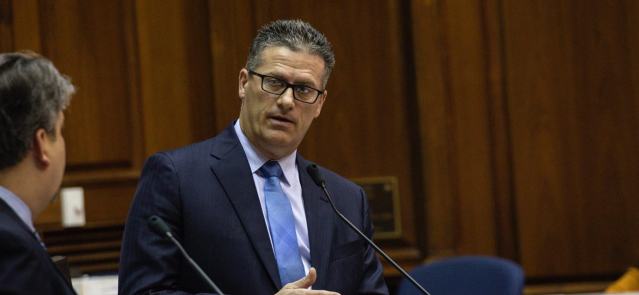“Concerning,” “disturbing” and “shocking” were adjectives that lawmakers used to highlight their feelings about the destruction of some KanCare evaluation documents.
The Bethell Joint Committee on Home and Community Based Services and KanCare Oversight on Tuesday reviewed the recent selection of contractors for Kansas’ Medicaid program as a judge continues to ponder whether to put the entire process on hold.
In May, Kansas selected Sunflower Health Plan, UnitedHealthcare Community Plan and Healthy Blue as the KanCare managed care organizations starting Jan. 1, 2025.
Last month, Aetna Better Health sued Kansas over the procurement process after the state rejected its and CareSource Kansas’ protests of the decision.
Jane Brown, president and CEO of Aetna Better Health, told the committee a big point of contention was the destruction of records that could’ve helped with the auditing process. She likened it to post-election audits to check vote totals.
“You should be able to verify or validate in some way or fashion that the final count is accurate,” she said. “Unfortunately, we can’t do that.”
Attorneys for state agencies involved in the litigation referred to the documents as “individual evaluation notes.”
The Kansas Department of Health and Environment confirmed to Mercer, a consulting firm used for the bid process, that those documents were destroyed March 7 based on the consultant’s recommendation, according to emails records Aetna requested.
Rep. Will Carpenter, R-El Dorado, said his issue isn’t related to the KanCare contractors the state selected. He said transparency issues marred the process.
“This is about a fair process, and that is what disturbs me, and rightly so,” he said.
KDHE General Counsel Brian Vazquez, responding to a question from Sen. Molly Baumgardner, said he wasn’t consulted about whether the documents should be destroyed.
Baumgardner, R-Louisburg, said it’s “very concerning” the state would move to destroy documents without attorney consultation considering the previous procurement process in 2018 led to a lawsuit.
“It seemed reckless and careless,” she said.
Sen. Virgil Peck, R-Havana, and Rep. Barbara Ballard, D-Lawrence, backed Baumgardner’s line of thinking. Peck said it was “amazing” that any document was destroyed based on previous history.
“I’m a lot shocked because of what we have been told as legislators,” he said, “to make certain that we either do not put anything in writing or, if we do, that we maintain a record.”
Ballard said her employer, the University of Kansas, requires employees to maintain notes for three years if they receive grants in case of a review. She said employees also keep those documents for hiring and scholarship decisions the university makes.
“Transparency is an issue for me in this,” she said. “You’ve answered all of the questions I have, yet I feel very uneasy about the process.”
Fixing the process
The committee made clear it didn’t want another procurement process with destroyed documents.
Rep. Brenda Landwehr, R-Wichita, said the committee would discuss at its October meeting a proposal for the upcoming legislative session to address the issue.
“The destruction of documents is what’s really raised a whole lot of questions,” the committee chair said. “I don’t care if it’s a Republican governor or a Democrat governor. It’s irrelevant to me.”
Sen. Pat Pettey, D-Kansas City, and Rep. Susan Ruiz, D-Shawnee, expressed concerns about a bill reaching further than what the committee might intend.
“I’m just concerned if we look at a piece of legislation that has a broad implication to any kind of RFP [request for proposal] that any department deals with,” Pettey said.
Ruiz asked if there’s a way to make a change without going through the legislative process, which opens up the possibility of procurements becoming “even more complicated.”
While Sen. Renee Erickson, R-Wichita, agreed that fixing the issue is important, she bluntly expressed her frustration with potentially passing a law for a matter she believes should be “common sense,” saying, “I shouldn’t have to tell my kids not to poop in the yard.”
The push to change the process would accomplish one of Aetna’s goals.
Aetna’s Brown told State Affairs her motivation was for the committee to “see what we see” concerning process flaws and take action to refine the rules during next year’s session. Lawmakers have a responsibility to ensure “good, clean and honest processes” are in place, she said.
“My hope is that in any future procurements that happen after this, that the process is much more organized, that it’s cleaner and that it is free from this sort of taint or last-minute decision-making, behind-the-scenes stuff,” Brown said.
Latest on court case
Shawnee County District Court Judge Thomas Luedke on Monday ruled that Healthy Blue, Sunflower and United can intervene in Aetna’s lawsuit. But a ruling on the company’s injunction request is still pending.
At a hearing last week, Aetna withdrew its opposition to the parties entering the case. The company wants the court to rule that it would have been one of the top three bidders “without the state’s errors.”
Brown said the judge mentioned at the hearing that the ruling would come “very soon.” She said she expects an injunction ruling before the next hearing on Sept. 17.
If the court doesn’t make Kansas award Aetna one of the three contracts, the company requested the state either award a fourth contract or re-bid the KanCare contracts. Aetna said it would also accept “other relief as this Court deems just and proper.”
Aetna’s lawsuit focuses on Healthy Blue, which the state selected in a tiebreaker after both companies scored 522 out of a possible 1,000.
The company said in court filings the state should have disqualified Healthy Blue for failing to disclose it hired the former Kansas Medicaid director and for its previous performance under the name Amerigroup Kansas.
Aetna replaced Amerigroup as a KanCare contractor in 2018 after performance issues. In 2021, Amerigroup Kansas Inc. changed its name to Community Care Health Plan of Kansas Inc. — Healthy Blue’s official business name.
Bryan Richardson is the managing editor at State Affairs Pro Kansas/Hawver’s Capitol Report. Reach him at [email protected] or on X @RichInNews.





